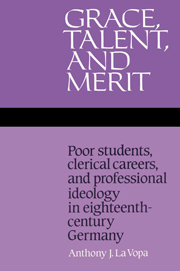 Grace, Talent, and Merit
Grace, Talent, and Merit Book contents
- Frontmatter
- Contents
- Acknowledgments
- Introduction
- PART I POOR STUDENTS
- PART II CALLING, VOCATION, AND SERVICE
- PART III NEW DEPARTURES
- 9 Orthodoxies and new idioms
- 10 Professional ideologies: the making of a teaching corps
- 11 The clerical identity
- 12 Radical visions: Johann Gottlieb Fichte
- Epilogue
- Bibliographical note
- Index
11 - The clerical identity
Published online by Cambridge University Press: 26 March 2010
- Frontmatter
- Contents
- Acknowledgments
- Introduction
- PART I POOR STUDENTS
- PART II CALLING, VOCATION, AND SERVICE
- PART III NEW DEPARTURES
- 9 Orthodoxies and new idioms
- 10 Professional ideologies: the making of a teaching corps
- 11 The clerical identity
- 12 Radical visions: Johann Gottlieb Fichte
- Epilogue
- Bibliographical note
- Index
Summary
VOCATIONS, CAREERS, AND OFFICES
In the hagiography of every modern profession there is a heroic age of struggle. For German schoolmen, the struggle on one front pitted a fledgling profession against the clerical legacy that kept it fastened to an archaic identity. But when the schoolmen's act of secession is set in a larger process – when it is understood as a stage in the transformation of the learned estate into a Bildüngsburgertum – it can be seen to have occurred within the formation of a new consensus. In many respects teachers and clergymen fashioned similar ideological responses to analogous conditions, opportunities, and threats. There are underlying parallels in the initial impetus behind their formulations of professional ideologies and in their rhetorical shifts in gear from utilitarianism to neohumanism at the end of the century.
While teachers reached for an entirely new status, reform-minded clergymen in the last decades of the eighteenth century felt compelled to react against a precipitous decline in the prestige of their order. There was nothing new about this theme; one encounters the same lament in the early eighteenth century, especially among Pietist clergymen, and indeed in the immediate aftermath of the Thirty Years' War. But whereas the early Pietists traced the corruption of church life to the disruptions of war, clergymen a century later attributed the spread of irreligiosity to a superficial but nonetheless corrosive secular rationalism. Were popular attitudes toward the clergy actually changing? The very recurrence of alarm on this score gives pause for skepticism, and it is reinforced by clergymen's equally incessant complaints about popular attachment to obsolete confessional traditions.
- Type
- Chapter
- Information
- Grace, Talent, and MeritPoor Students, Clerical Careers, and Professional Ideology in Eighteenth-Century Germany, pp. 326 - 350Publisher: Cambridge University PressPrint publication year: 1988


